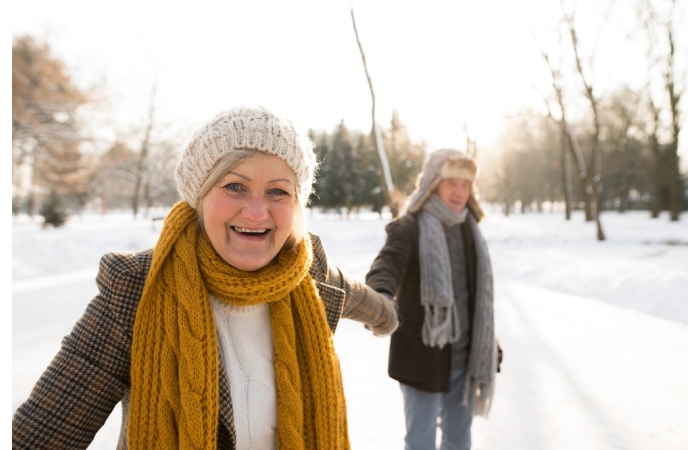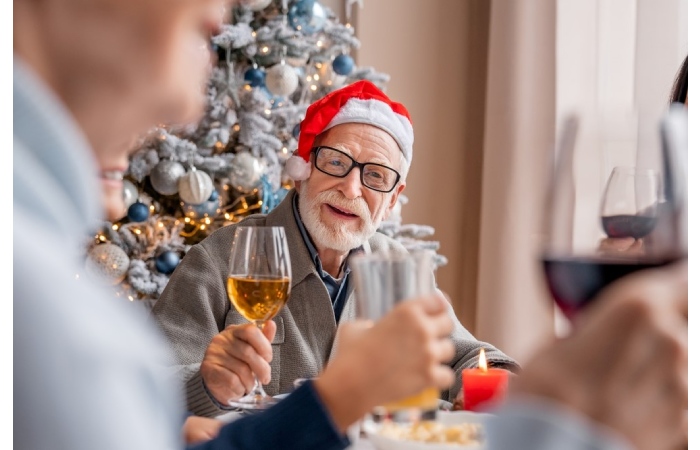Healthy During the Colder Months
Keeping elderly loved ones active and healthy all year round is key to longevity. However, the cold temperatures and inclement weather do make it more difficult during the winter months, and your older relative might need some support from you to stay active during the season. Here are nine ways you can help elderly family members stay healthy this winter, from adaptive coats to winter transportation:
Table of Contents
Do a winter Home Safety Audit.
Winter brings new hazards, both indoors and outdoors. Heaters should be serviced in the fall — before they need to be used in the winter — to prevent potential fires. Indoor fireplaces should also be inspected before you use them for the first time each season. Windows and doors should also be inspected for damage and cracks, which can lead to heat loss. If there are any trees that could potentially fall on the house during a winter storm, they might need to be trimmed or even removed.
Pitch in with Outside Chores.
Outdoor chores are already a struggle for many elderly adults, and the inclement weather and cold temperatures makes it even harder. If you live in the area, offer to help out with winter chores such as salting the sidewalks, shoveling the driveway, hanging up holiday lights and chopping wood for the fireplace. Older adults often have a hard time judging their own capabilities, so they may insist on doing things on their own when they really shouldn’t. When in doubt, offer to help them out. You might just prevent an accident.
Offer to help with Transportation.
Winter weather makes it hard for older adults to get out to run errands or attend social events. Snow, rain and sleet reduce visibility, as do shortened daylight hours. As a result, many seniors simply stay at home rather than deal with the hassle and risk of getting on the road. If you live nearby, offer to help drive them around so they don’t have to get behind the wheel. For instance, you could make running errands part of your weekly visit. If you don’t live nearby, ask friends or family in the area if they can help out with transportation.

Get them the Right Shoes and Clothes.
Proper gear is essential for the winter — especially for seniors, who often have trouble regulating their own body temperatures. They should always dress in layers of senior clothing, even inside, to ensure that they will stay warm. At night, they should wear flannel nightgowns or other pajamas that are similarly warm. As for outerwear, they should have coats that are water-resistant or waterproof, as well as hats, gloves, scarves and other necessary cold weather accessories. They should always wear non-skid shoes, even inside, and have waterproof boots to wear outdoors during inclement weather.
Make Sure their Home Stays Warm.
Seniors may get cold indoors without realizing it. Make sure that they keep the house temperature set to a minimum of 68 degrees Fahrenheit, and higher if need be (they may be tempted to turn it down to save on heating bills). Place warm blankets in every room of the house. Space heaters and heating pads can also be helpful, but they must be used according to the instructions to prevent the risk of fire. A heated mattress pad and/or blanket can help your loved one sleep comfortably if their bedroom tends to get cold.
Help them find New Hobbies.
Hobbies are an excellent way to pass the time during any season, and they are especially helpful in the winter when everyone is cooped up inside. If your relatives don’t currently have indoor hobbies, encourage them to find one (or more) this winter. Crafting projects are always a popular option, but they can also pursue education classes online or in person if that appeals more to them. In fact, there are even classes that cater specifically to seniors looking to pick up new skills later in life.

Encourage them to eat Healthy.
Traditional holiday fare may be delicious, but all the sugar, fats and alcohol can be hard on seniors’ digestive tracts. Encourage your elderly loved ones to eat a healthy diet full of lean proteins, whole grains, fruits and vegetables, and healthy fats. They can indulge a little bit, but make sure that they eat and drink in moderation to avoid adverse health consequences and gastrointestinal distress.
Urge them to Exercise Indoors.
Exercising is yet another activity that becomes more difficult in the winter. This is especially true for seniors who usually exercise outside in the milder months. Encourage them to find alternatives that they can do indoors, whether that’s lifting weights at the gym or doing Pilates at home. If they are new to exercise, senior-specific exercise classes can help them get started and show them how to do the moves properly to reduce the risk of injury.
Connect with them Socially.
Social time is incredibly important for good mental health. Unfortunately, if your elderly loved one has limited mobility, that can prove a huge hindrance to attending in-person events and family get-togethers. Offer to drive them, or to bring the party to them so they don’t have to leave the house. If your loved one is up for navigating the technology. Connecting with people virtually over video chat is also a great alternative if they live far away. You may need to provide some tech support and show them how the video call works if they’ve never done it before.
Follow these tips to help keep your loved ones happy and healthy this winter. Stay warm and stay safe this year and beyond

